Overview
This article thoughtfully explores the distinctions between founders and co-founders, shedding light on how these roles significantly influence the success of startups. It recognizes the challenges that solo founders often encounter, such as increased pressure and limited resources. In contrast, ventures with multiple founders tend to attract greater investor interest and achieve higher success rates. This is largely due to their ability to navigate challenges with a well-rounded leadership team, which fosters collaborative decision-making and diverse skill sets.
As many of our members have experienced, having a supportive team can make all the difference in overcoming obstacles and creating a thriving business. We understand that the journey of entrepreneurship can be daunting, but with shared responsibilities and a nurturing community, the path to success becomes much more attainable.
Introduction
In the ever-evolving world of startups, the distinction between founders and co-founders transcends mere semantics; it fundamentally shapes a venture's trajectory. We recognize that while founders often ignite the spark of innovation with their original ideas, co-founders bring essential skills and perspectives that can elevate a startup's potential.
As the entrepreneurial landscape becomes increasingly competitive, it’s crucial for aspiring business leaders to understand these roles. Many of our members have experienced firsthand the advantages of collaboration, as well as the challenges that can arise from solo leadership.
The dynamics between founders and co-founders significantly influence not just the internal workings of a startup, but also its ability to attract investment and achieve long-term success. By delving into these nuances, entrepreneurs can make informed decisions that align with their vision and enhance their chances of thriving in a crowded marketplace.
We understand that navigating these relationships is not always straightforward, but with the right support and insights, you can foster a collaborative environment that propels your startup forward.
Defining Founders and Co-Founders: Key Roles in Startups
In the dynamic world of entrepreneurship, it’s crucial to grasp the distinction between 'co-founder vs founder.' These terms are often used interchangeably, yet they embody unique roles that are vital to a venture's success. The originator is typically the individual who conceives the original idea and takes the initiative to establish the business. They are the visionaries who lay the foundation for the organization's mission and objectives, often fueling the initial passion and direction.
Conversely, co-founders work alongside the originator to help realize that vision, bringing complementary skills and knowledge that enhance the venture's potential. For instance, while an entrepreneur may concentrate on the overarching vision and strategic direction, a co-entrepreneur might oversee operational aspects or marketing strategies, fostering a balanced leadership dynamic essential for navigating the complexities of the business landscape.
Understanding the differences between co-founder and founder roles is vital, as it directly influences how responsibilities are shared and decisions are made within the organization. Many of our members have experienced the challenges that arise when these roles are not clearly defined. Data reveal that around 70% of new businesses are launched by groups rather than individuals, highlighting the importance of collaboration in the entrepreneurial journey. Moreover, with over 12,000 FinTech startups worldwide, recognizing the roles of the primary individuals and the distinctions between co-founders and founders in this growing sector becomes even more critical.
Research has shown that teams with diverse personality traits among creators and co-creators significantly bolster their chances of success, as illustrated in the case study titled 'The Role of Diversity in Startup Success.' This study emphasizes how varied perspectives can foster innovation and resilience, underscoring the value of collaboration.
Expert opinions also highlight the necessity of clearly defining these roles. As Andrew Bush, an experienced entrepreneur, shares, "As a CEO, I always discussed financial risks with my technical group or, at the very least, with my tech-savvy partner." This observation illustrates how effective communication and role clarity can lead to improved decision-making and risk management.
As we look toward 2025, the entrepreneurial ecosystem is evolving, with a growing emphasis on supporting diverse founding groups, including women leaders, which could further transform business dynamics. We understand that as the landscape becomes increasingly competitive, recognizing the unique contributions of creators and co-creators will be essential for aspiring entrepreneurs who aim to build successful ventures.
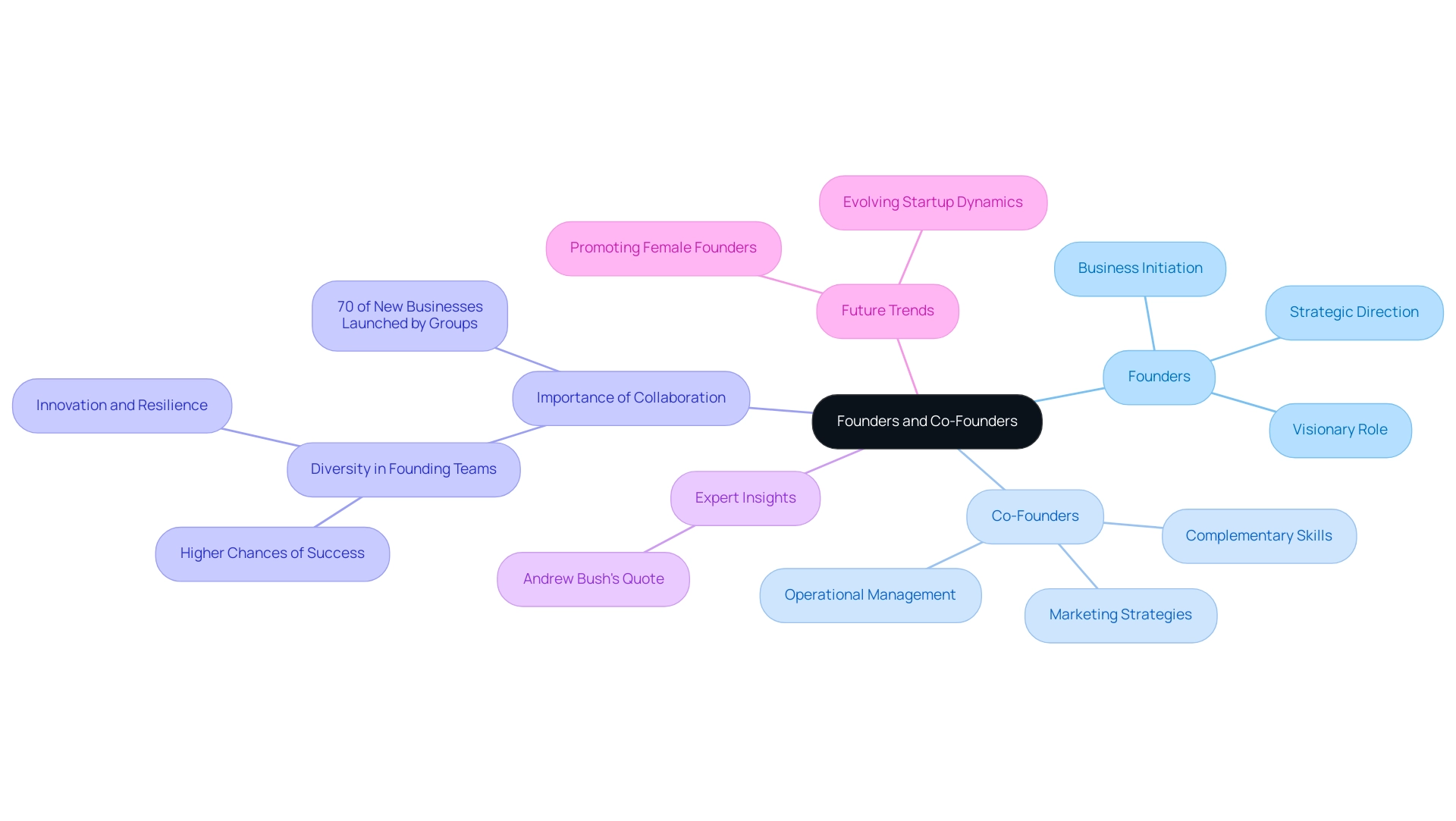
The Solo Founder Experience: Pros and Cons
Being an individual entrepreneur brings a unique mix of benefits and challenges that can significantly shape the journey of a new venture. On the positive side, individual entrepreneurs enjoy complete autonomy over decision-making, allowing them to make swift pivots and adapt to market changes without needing consensus. This independence enables them to seamlessly implement their vision, fostering a cohesive brand identity that can resonate strongly with customers.
However, this autonomy also comes with considerable challenges. Independent entrepreneurs often face heightened pressure and anxiety, as they carry the entire burden of accountability for their venture's success or failure. The absence of co-founders can limit access to diverse skill sets and perspectives, which are crucial for driving innovation and growth. The discussion surrounding co-founders versus founders in multiple-founder startups highlights how collaboration can enhance problem-solving and creativity among team members.
As Sam Altman has noted, having co-founders not only helps in sharing the workload but also provides crucial moral support, which can be invaluable during tough times. Financially, individual entrepreneurs may struggle to secure funding, as investors frequently favor teams with several leaders. This preference underscores the differences in co-founder versus founder roles, as teams can share responsibilities and bring a broader range of skills to the table. Statistics suggest that consistent ventures report valuations of approximately $800,000, while those led by individual entrepreneurs may encounter challenges in achieving comparable success due to perceived constraints in their operational capacity.
Additionally, investor preferences may vary, and creators should be prepared to confront issues related to the choice of their founding structure. The obstacles faced by individual entrepreneurs in 2025 are becoming increasingly evident. As the entrepreneurial landscape evolves, the need for collaboration and shared expertise is more critical than ever. Initiatives like Finance, Freedom, Fellows emphasize the importance of collaborative investment evaluation and due diligence, where leveraging the collective expertise of over 300 members can lead to high-grade deal opportunities.
This collaborative approach not only enhances the evaluation process but also empowers members to navigate the complexities of the investment landscape more effectively. Testimonials from members of Finance, Freedom, Fellows highlight how this collective effort has fostered successful investments and a supportive community. Mihkel Torim, a leader in the field, emphasizes that the club's commitment to providing members with essential knowledge and tools is crucial for addressing these difficulties.
In summary, while the benefits of being an independent entrepreneur include autonomy and a clear vision, the drawbacks—such as heightened stress, restricted skill diversity, and obstacles in obtaining funding—underscore the intricacies of navigating the business ecosystem alone. Understanding these dynamics, particularly the advantages of collaboration and collective due diligence at Finance, Freedom, Fellows, is essential for aspiring entrepreneurs as they contemplate their founding structures.
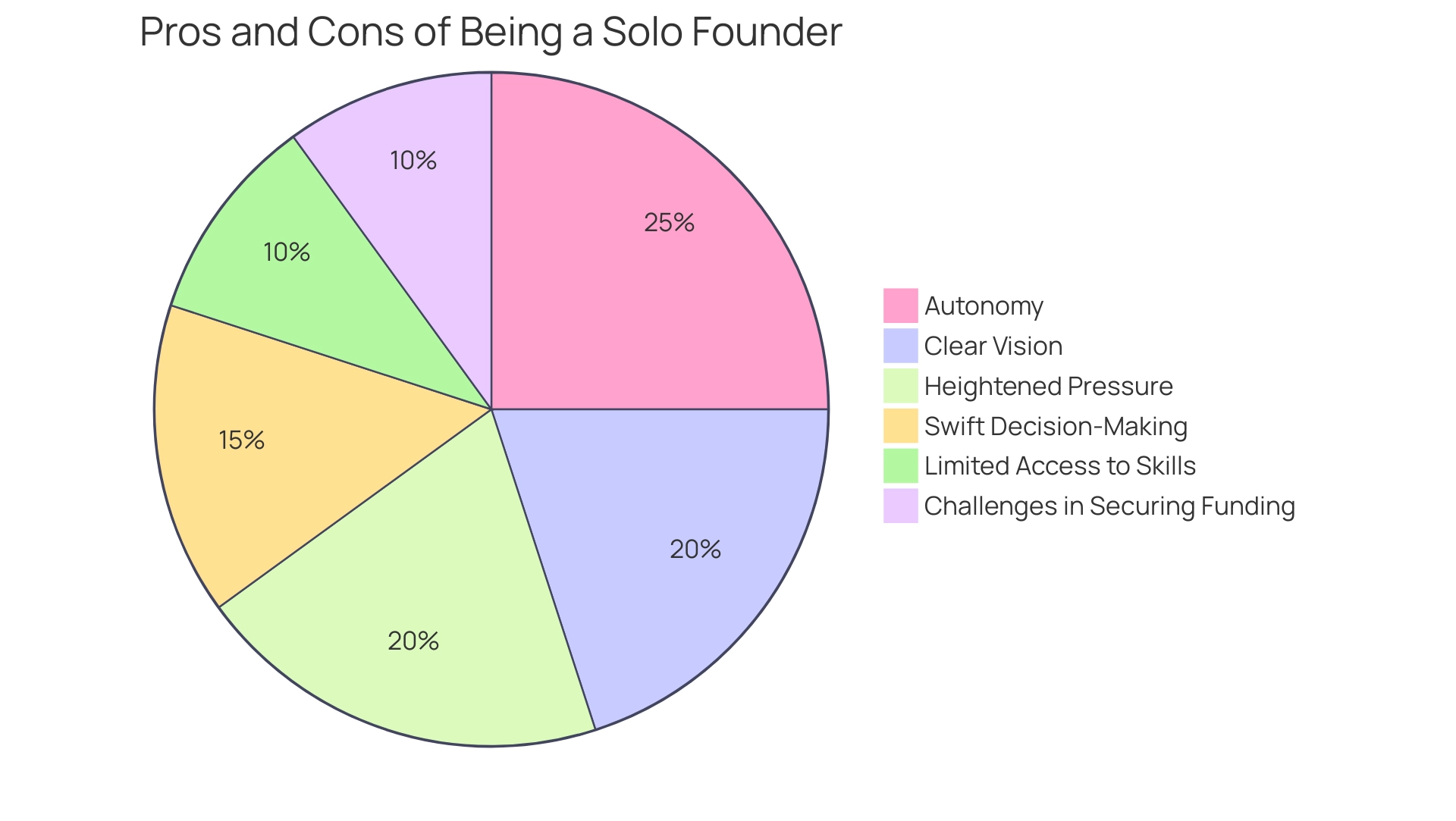
The Collaborative Approach: Advantages and Disadvantages of Multiple Founders
The presence of multiple co-founders, as opposed to a single founder, can significantly enhance a new venture's chances of success. This collaborative approach allows for the pooling of diverse resources, skills, and networks, fostering innovative solutions and strengthening market presence. Each entrepreneur can draw upon their unique strengths—whether in technology, marketing, or finance—resulting in a well-rounded leadership team that is better equipped to navigate the complexities of the business landscape.
However, we understand that this model is not without its challenges. Conflicts may arise over critical issues such as decision-making, equity distribution, and strategic direction, which can create a toxic work environment if not managed effectively. The necessity for agreement among co-founders can also slow down the decision-making process, potentially hindering the company's agility in a rapidly evolving market.
Statistics suggest that new ventures with several co-owners tend to attract more investor attention, as they are perceived to provide increased stability and shared risk. For instance, Germany's VC investment totaled $6.6 billion, highlighting the robust funding landscape that supports collaborative ventures. Yet, investors are acutely aware of the interpersonal conflicts that can emerge, which may derail progress.
The success of SeedBlink, a multi-creator startup, illustrates how collaboration among entrepreneurs can effectively address challenges and drive innovation within the startup ecosystem. Radu Georgescu, founder of SeedBlink, emphasizes that "a diverse founding team can lead to more robust problem-solving capabilities and a richer pool of ideas."
Expert insights reveal that the optimal choice in the debate of co-founder versus founder hinges on individual personality traits, skills, goals, and the specific nature of the business. As many of our members have experienced, understanding the dynamics of co-founder versus founder becomes increasingly crucial in an evolving entrepreneurial landscape. The COVID-19 pandemic has resulted in a more equitable distribution of funding for new ventures, with secondary US cities like Austin and Miami witnessing increased investment, further contextualizing the current entrepreneurial environment and its relevance to co-founding dynamics.
In 2025, the collaborative method is acknowledged as a crucial element in new business success, with many entrepreneurs highlighting the significance of teamwork in their journeys.
In summary, while the benefits of having multiple co-founders versus a single founder in a startup are substantial—such as enhanced innovation and shared responsibilities—the potential for conflict and slower decision-making must be carefully managed. By fostering open communication and understanding among team members, we can ensure sustained growth and success.
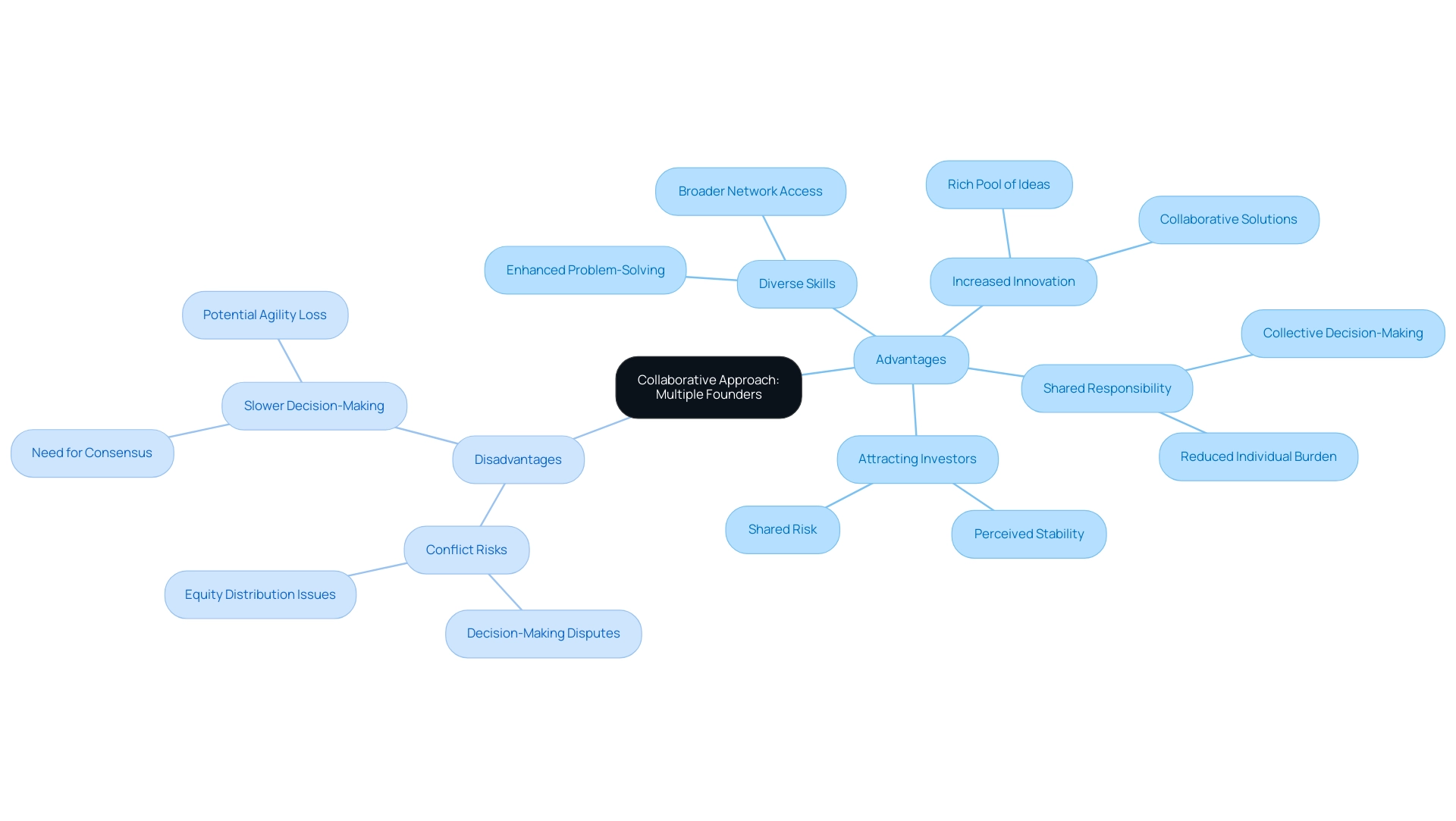
Key Considerations for Choosing Between Solo and Co-Founders
When considering the option between being an individual entrepreneur or evaluating co-founder versus founder arrangements, it's essential to assess several critical factors with care. First and foremost, a thorough evaluation of personal strengths and weaknesses is vital. An individual with a robust and diverse skill set may find success in managing all facets of the business independently, but we understand that this path can feel overwhelming.
However, if there are identifiable gaps in expertise—such as technical skills, marketing acumen, or financial management—bringing on co-founders with complementary abilities can significantly enhance the venture's potential for success. Many of our members have found that collaboration can lead to greater innovation and support.
Risk tolerance is another pivotal consideration. Solo founders shoulder the entirety of financial and operational risks, which can indeed be daunting. In contrast, co-founders can distribute these responsibilities, providing a safety net that can be crucial during challenging times. This shared risk can foster a more resilient approach to navigating the uncertainties inherent in startup ventures.
The startup's vision and culture are equally important. If collaboration and group effort resonate with your core values, forming a co-founding group may yield greater benefits. A united group can cultivate a dynamic environment that encourages innovation and adaptability, essential traits in the fast-paced tech landscape. Yet, as Dharmesh Shah notes, the increase in group size can also lead to noise, confusion, and difficulties in holding meetings, highlighting the potential challenges of co-founding.
Moreover, evaluating your network and available resources is vital. Co-founders can expand your access to funding opportunities and strategic partnerships, which are often essential for early-stage ventures. For instance, the success of SeedBlink, a multi-creator company, illustrates how collaboration among its creators can drive innovation and growth, showcasing the advantages of a diverse founding group. Their experience illustrates how a well-balanced founding group can maneuver through the challenges of the entrepreneurial landscape efficiently.
Statistics indicate that in the co-founder versus founder scenario, ventures with co-founders generally achieve greater success than those led by individual founders. Research indicates that co-founders often bring a wider array of skills and perspectives, which can lead to more effective problem-solving and decision-making. Furthermore, the global quantum computing market size is predicted to grow from $470 million in 2021 to $1,765 million in 2026, highlighting the growth potential of technology companies and the significance of having a strong team to take advantage of such opportunities.
As the global entrepreneurial ecosystem continues to evolve, understanding these dynamics will be crucial for aspiring business founders. We understand that the decision to pursue a solo path or to engage co-founders should be informed by a careful analysis of personal capabilities, risk appetite, cultural alignment, and resource availability, especially when considering the co-founder versus founder dynamic. Insights from successful entrepreneurs emphasize the importance of choosing partners who not only complement your skills but also share your passion and vision for the venture. As new ventures increasingly turn to technology for financial management, these considerations become even more relevant in today's rapidly changing landscape.
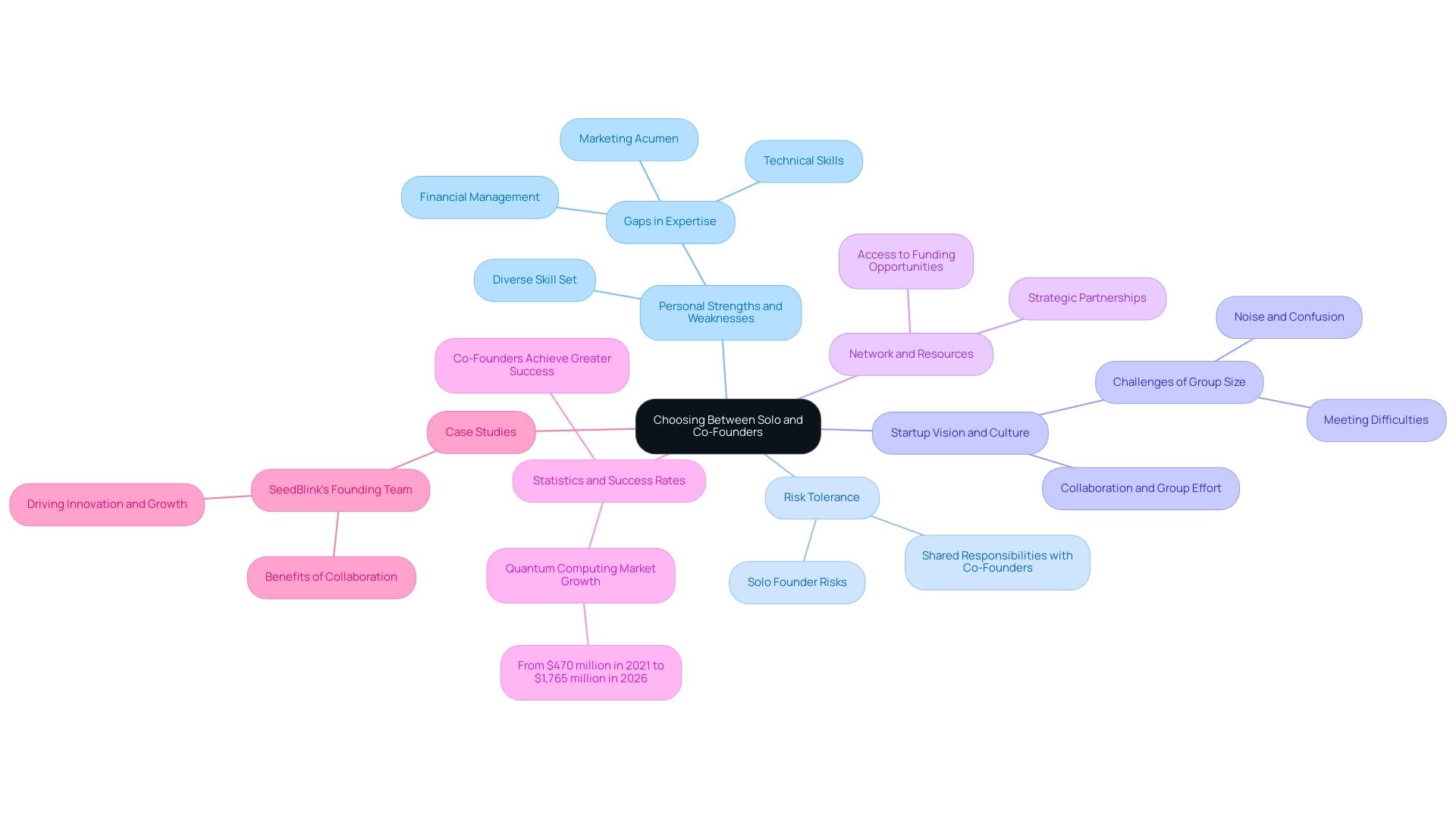
Impact on Fundraising: How Founder Structure Influences Capital Raising
The composition of a founding group, particularly the distinctions between co-founder and founder roles, is pivotal to a new venture's fundraising success. We understand that investors often perceive new ventures with multiple creators as less risky, given the diverse perspectives and shared responsibilities they bring. This perception can significantly enhance interest from venture capitalists and angel investors, who typically prefer to invest in a team rather than an individual entrepreneur.
A control group study involving 6,685 employees across various occupations has revealed that certain combinations of entrepreneurs' personalities correlate strongly with higher chances of business success. This underscores the importance of collaborative dynamics in achieving favorable outcomes, which many of our members have experienced firsthand.
Co-founders can also tap into their networks to access funding opportunities that an individual entrepreneur might find challenging. This collaborative approach not only broadens the search for potential investors but also enriches the strategic vision of the new venture. Insights from leading Estonian tech investors like Sten Tamkivi and Kristjan Vilosius, co-founders of Finance, Freedom, Fellows, highlight the crucial role of community in early-stage investments, especially within the ClimateTech sector.
Their experiences illustrate how a strong network can ease access to resources and mentorship, which are invaluable for new ventures navigating the complexities of fundraising. We recognize that individual founders can also achieve fundraising success, particularly if they possess a robust track record or a compelling vision that resonates with investors. Expert insights from industry leaders emphasize that effectively communicating the venture's value proposition is essential. As Harvard Business School Professor Tom Eisenmann points out, the fundraising process can be intensive, often requiring presentations to 58 investors and 40 detailed meetings over 12 weeks to successfully close a seed round.
This highlights the necessity for founders—whether alone or in groups—to express their business strategies persuasively.
Furthermore, case studies demonstrate that new ventures excel in fundraising when there is clarity regarding the roles in the discussion of co-founder versus founder. The emphasis on the 'Why Now?' slide in pitch decks has become increasingly significant, as it articulates the market's readiness for the company's offering.
A compelling 'Why Now?' slide can greatly enhance a new venture's appeal to investors by focusing on seizing market opportunities, further illustrating how leadership structure impacts capital raising. The experiences of Tamkivi and Vilosius serve as a testament to how innovative thinking and resilience can drive investment strategies, particularly in the evolving tech landscape.
It is also vital to consider the implications of ownership structure in the context of later-stage startups. Those that scale prematurely often encounter inconsistencies and are more likely to fail, emphasizing the importance of a well-organized founding group in navigating the complexities of growth. Ultimately, the effectiveness of an entrepreneur or founding team in communicating their vision and demonstrating their capability to execute their business plan underscores the significance of understanding co-founder versus founder roles, which is what truly drives fundraising success.
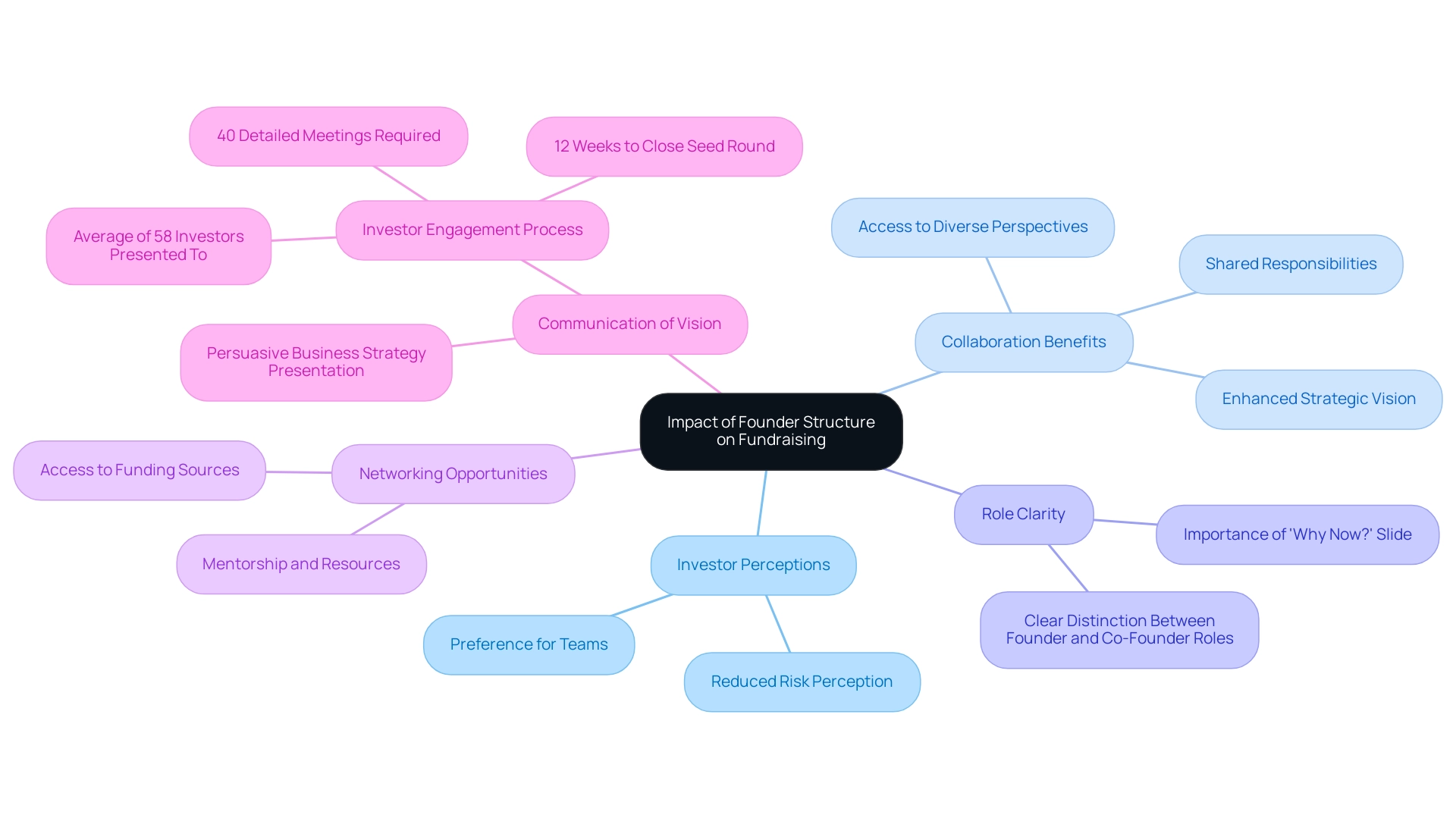
Navigating the Founder Dilemma for Startup Success
Navigating the founder dilemma is pivotal for achieving entrepreneurial success, and we understand how challenging this journey can be. Entrepreneurs often find themselves at a crossroads in the debate of co-founder versus founder: should they embark on their journey alone or collaborate with co-founders? Each option carries its own set of advantages and challenges that can significantly influence the venture's trajectory.
Research shows that larger, personality-diverse teams in new ventures tend to have a higher likelihood of success. This underscores the importance of diverse perspectives in decision-making processes, which can be a source of strength and innovation.
In 2025, statistics reveal that roughly 75% of American new businesses fail within the first 15 years, as highlighted by Josh Howarth. This statistic serves as a poignant reminder of the critical nature of entrepreneurial choices. The impact of these decisions extends far beyond initial formation; they can shape the startup's culture, operational dynamics, and ultimately, its market performance. For solo entrepreneurs, successful strategies often involve leveraging their unique vision and agility, while the distinction between co-founder and founder illustrates how co-entrepreneurs can benefit from shared responsibilities and complementary skill sets.
Case studies provide valuable insights into how effectively navigating founder dilemmas can lead to enhanced innovation and performance. For instance, mentors of new ventures have shared that co-founders who engage in open communication and align their values are more likely to foster a resilient environment. Additionally, exploring personality traits among successful entrepreneurs reveals that those who understand and embrace their differences can create more cohesive and efficient teams.
This aligns with findings from the case study titled "Applications of Personality Diversity Beyond New Ventures," suggesting that insights gained from analyzing entrepreneurs' personalities can enhance team performance and innovation across various sectors.
Moreover, research has delved into various classification algorithms to distinguish successful entrepreneurs from employees based on personality traits, utilizing metrics like accuracy, F1 score, and AUROC for evaluation. As entrepreneurs weigh their options, it is essential to align their decisions with their long-term goals and available resources. By doing so, they can position themselves more effectively to tackle the challenges of the competitive business landscape, ensuring that their choices resonate with their vision and values.
Ultimately, whether choosing to go solo or partner with co-founders, understanding the implications of these decisions is crucial for navigating the co-founder versus founder dilemma and driving startup success. We are here to support you on this journey, reminding you that you are not alone in facing these important choices.
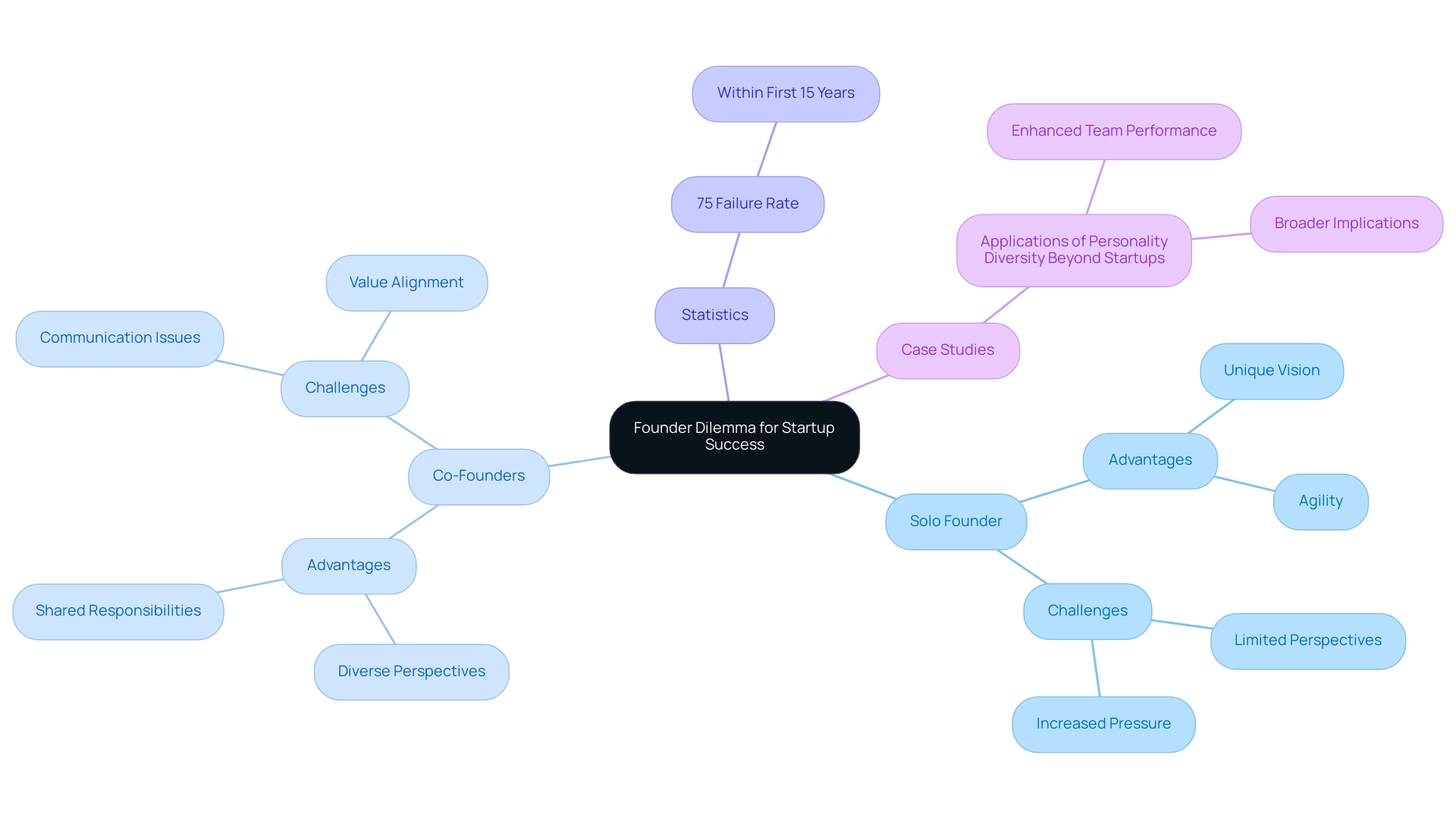
Conclusion
The exploration of the roles of founders and co-founders reveals the profound impact these dynamics have on a startup's journey. Founders are the visionaries who initiate the venture, while co-founders bring essential skills and perspectives that enrich and elevate that vision. This collaborative approach often fosters increased innovation, enhances problem-solving, and strengthens market presence, highlighting the importance of teamwork in navigating the complexities of the startup landscape.
However, the decision to pursue a solo path or to engage co-founders requires thoughtful reflection on personal strengths, risk tolerance, and cultural alignment. Solo founders may relish their autonomy, yet they often face significant challenges, including stress and limited access to diverse expertise. On the other hand, co-founders can share responsibilities and leverage their networks to bolster fundraising efforts, though they must also navigate the potential for conflict and slower decision-making processes.
As the startup ecosystem continues to evolve, it becomes increasingly vital to understand the implications of founder structure. Successful entrepreneurs recognize the importance of aligning their founding decisions with their long-term goals and available resources. Whether choosing to venture alone or in collaboration, the insights gained from this exploration can empower aspiring entrepreneurs to effectively navigate the founder dilemma, positioning them for success in a competitive marketplace. We understand that this journey can be challenging, but together, we can foster a supportive community that uplifts and guides each other toward our shared goals.
Frequently Asked Questions
What is the difference between a founder and a co-founder?
A founder is the individual who conceives the original idea and initiates the establishment of the business, laying the foundation for its mission and objectives. A co-founder works alongside the founder, bringing complementary skills and knowledge to help realize that vision.
Why is it important to understand the roles of founders and co-founders?
Understanding these roles is crucial as it influences how responsibilities are shared and decisions are made within the organization. Clear role definitions can prevent challenges that arise from ambiguity and enhance collaboration.
What percentage of new businesses are launched by groups rather than individuals?
Approximately 70% of new businesses are launched by groups, highlighting the significance of collaboration in the entrepreneurial journey.
How does diversity among team members affect startup success?
Research indicates that teams with diverse personality traits among creators and co-creators significantly enhance their chances of success, fostering innovation and resilience.
What are the advantages of being an individual entrepreneur?
Individual entrepreneurs enjoy complete autonomy over decision-making, allowing for swift pivots and the ability to implement their vision seamlessly, which can create a strong brand identity.
What challenges do independent entrepreneurs face?
Independent entrepreneurs often experience heightened pressure and anxiety due to the sole responsibility for their venture's success or failure. They may also lack access to diverse skill sets and perspectives, which are important for innovation and growth.
How do investor preferences differ between individual entrepreneurs and those with co-founders?
Investors frequently favor teams with multiple leaders, as these teams can share responsibilities and bring a broader range of skills, which can enhance the venture's potential for success.
What initiatives emphasize the importance of collaboration in entrepreneurship?
Initiatives like Finance, Freedom, Fellows highlight the value of collaborative investment evaluation and due diligence, leveraging collective expertise to navigate the complexities of the investment landscape effectively.
What is the overall impact of collaboration on the entrepreneurial ecosystem?
Collaboration is becoming increasingly critical as the entrepreneurial landscape evolves, as it enhances problem-solving, creativity, and the ability to secure funding, ultimately leading to more successful ventures.
